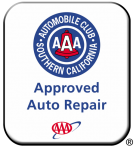Oil changes can be confusing, and we get a lot of questions. Some of the most asked questions are answered below, but we can’t possibly cover everything. If you want to know more about oil changes or want to talk about something that is going on with your car, give us a call at 626-332-3022.
When do I change my oil?

As with most things related to your vehicle, your owner’s manual is your go-to resource. Don’t make decisions based on past experience or guidance from companies that profit from the work. The only time to disregard this advice is with some newer cars that have service reminder monitors to alert you when your oil needs changing. These systems analyze not just how many miles you have traveled, but how hard you have driven your car. Whether you go old school with the manual or have a system that alerts you, get the oil changed when it’s time. The folks that engineered your vehicle have the insider knowledge on what oil change intervals will keep the engine running right.
How often should I check the oil level?
In addition to regular oil changes, go ahead and keep an eye on your oil level. We suggest checking it monthly—even the oil on newer cars may need to be topped off between changes. Though some newer cars don’t have a dipstick, most cars still do. Make sure the engine is off when you pull the dipstick out. There are usually two pinholes, the letters L and H, or MIN and MAX above and below crosshatching on the dipstick. As long as the oil is within the crosshatched area between those markings, the level is good.
Is there such a thing as changing the oil too often?
The “every 3,000-miles or 3-months” rule has become outdated as automakers have lengthened oil change intervals to 7,500 or even 10,000 miles. Again, check with your owner’s manual. Changing your oil too often can’t harm your engine the way not changing it enough can. But it can still cost you—money. If you go by the 3,000-mile rule on a car that only requires changes every 7,500 miles, you could needlessly spend an extra couple of hundred dollars per year.
How do I choose the right oil for my car?
Where do you look for this information? That’s right, check your owner’s manual, though some newer models have the recommended oil weight printed on the cap where you add oil. If you read your owner’s manual, you also won’t be upsold on synthetic oil if there is no need.
What’s the advantage of synthetic oil?
Synthetic oil is designed to breakdown less quickly. It withstands high temperatures better than traditional oil. This can prolong the life of your engine. If you change your oil regularly, though, there is no need to switch to synthetic oil. Again, the engineers of your car know what’s best for it, and their schedule for changes is based on the oil they recommend. There are a few exceptions to this rule. For example, some Volkswagen and Toyota models have had sludge issues. Synthetic oil is not recommended in the owner’s manual of these vehicles. But because it doesn’t break down as quickly, synthetic oil reduces sludge and benefits overall engine health.
That’s why you need trusted professionals, which is what you’ll get when you walk through the door at Bender’s Auto Care. Our friendly team is staffed with skilled customer service professionals and highly trained mechanics dedicated to making sure your vehicle gets you safely down the road. Aside from getting you on a regular maintenance schedule that includes oil changes, we perform nearly every service, including AC repair, radiator repair, and transmission service on most makes and models. For repair and service that gets done right the first time, call 626-332-3022 or request an appointment online today!


 More Personal, More Friendly Auto Repair in Covina
More Personal, More Friendly Auto Repair in Covina